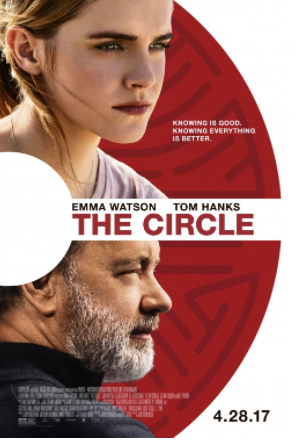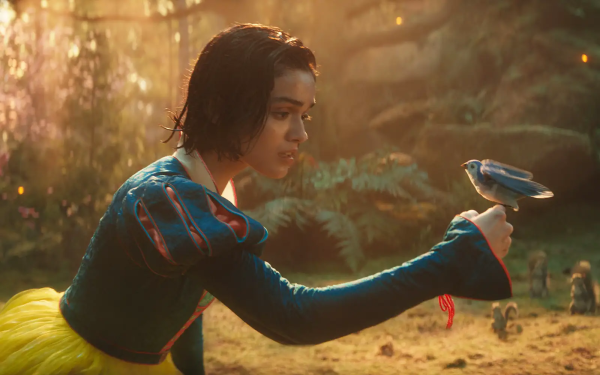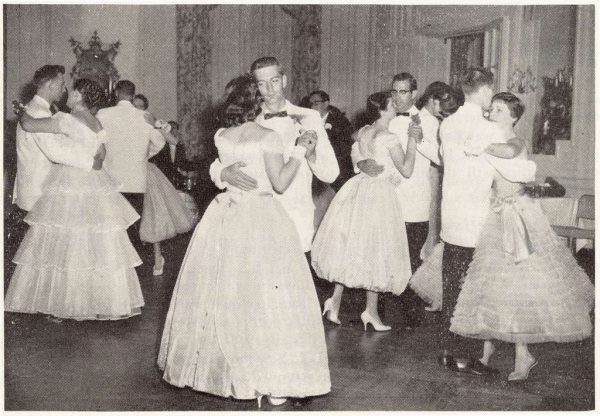“The Circle” Movie Review
By Allison Murphy

“The Circle” 2017 Movie Poster. Photo by www.imdb.com
The big-screen adaption of the international best-selling novel, The Circle by Dave Eggers, was released April 28. The film stars Emma Watson as the leading role, Mae Holland, who receives the opportunity of a lifetime: to work at the world’s most powerful technology and social media company known as the Circle.
This is an innovative web company that has taken the world by storm in its short life of six years. Innovations such as “TrueYou” and “SeeChange” have given the Circle its momentous success. Everything is seemingly perfect with the salary, community, and health benefits that are given to her family as well.
This is especially helpful, because Holland’s father has been recently diagnosed with Multiple Sclerosis.
As her life inside of the Circle increases, her life beyond becomes distant to the point that she will go long periods of time without even returning home. She is encouraged to attend more Circle events rather than visit her more than stressed-out family, and she is scolded for not participating on the social feeds as well as for keeping certain interests to herself.
Outside of the Circle are Holland’s parents and Mercer Medeiros, played by Ellar Coltrane, a man that when in scene with Holland exhibits tangible tension. It turns out that they had previously been a couple, and that is where the tension roots from. Both her parents and Medeiros believe the Circle is changing Holland and not for the better.
Annie Allerton, who was the close friend that had gotten her the job interview and is played in the film by Karen Gillan, becomes more distant than ever.
After a potentially fatal accident involving a kayak, Holland is asked to meet with Eamon Bailey, who is one of the most prominent faces of the Circle and is played by Tom Hanks.
Mae agrees to become a part of the Circle’s experiment to go “transparent” meaning that, at all times, she would wear a camera on her and almost every aspect of her life, besides the bathroom and in bed, would be recorded and saved.
Holland would also advertise her slogan that “Secrets are lies.” With this sense of transparency, Holland becomes one of the most popular people working at the Circle, and she is enjoying the new sense of power she has obtained. Mae has even earned the right to sit in on an executive meeting of the Circle, and in that meeting, she suggests ideas that would make the world a Circle utopia.
Junior Jordan Murphy said, “It was definitely cool with the technology, but it was a bit creepy because the people in the Circle wanted to basically have the world together online.”
Emma Watson is popularly known for her roles in the Harry Potter series as Hermione Granger, Beauty and the Beast as Belle, and The Perks of Being a Wallflower as Sam. Her co-star Tom Hanks is also popularly known for his roles in The Da Vinci Code as Robert Langdon, Forrest Gump as Forrest Gump, and Sully as Chesley “Sully” Sullenberger.
It is especially interesting that the director, James Ponsoldt, chose to change the ending of the story when he adapted it to the big-screen. A hopeful ending replaces the dark one that filled the text, and while the movie parallels the novel for a large majority of the plot, taking out the original ending of the story kind of left the movie feeling incomplete.
As I was exiting the movie theater, I found myself thinking, was that actually how they ended it?
Unfortunately, the original ending is a lot more realistic to the society we live in today rather than the one portrayed on the silver screen. Holland’s life has actually become better, and she believes that she has only lost the people that cannot go along with the new innovations of the future.
The original ending provides the realization that society will not turn its back on the advancements that are taking place regardless of what or whom it might be harming.
Overall, this movie provided clear evidence of how this parallels with society today. The movie shows us what it looks like when people have been convinced to share so much of themselves that they no longer have any of themselves left.
Specifically, in the text it states, “If things continue this way, there will be two societies – or at least I hope there will be two – the one you’re helping create, and an alternative to it. You and your ilk will live, willingly, joyfully, under constant surveillance, watching each other always, commenting on each other, voting and liking and disliking each other, smiling and frowning, and otherwise doing nothing much else…”
“I think it shows just how real the issue is of people giving up their privacy,” an anonymous Hills parent stated. “There is nothing worth giving yourself up for.”
This movie leaves the viewer with a priceless lesson, which can be most valuably stated by the author in the book itself: “We are not meant to know everything… Did you ever think that perhaps our minds are delicately calibrated between the known and the unknown? That our souls need the mysteries of night and clarity of day?”











































